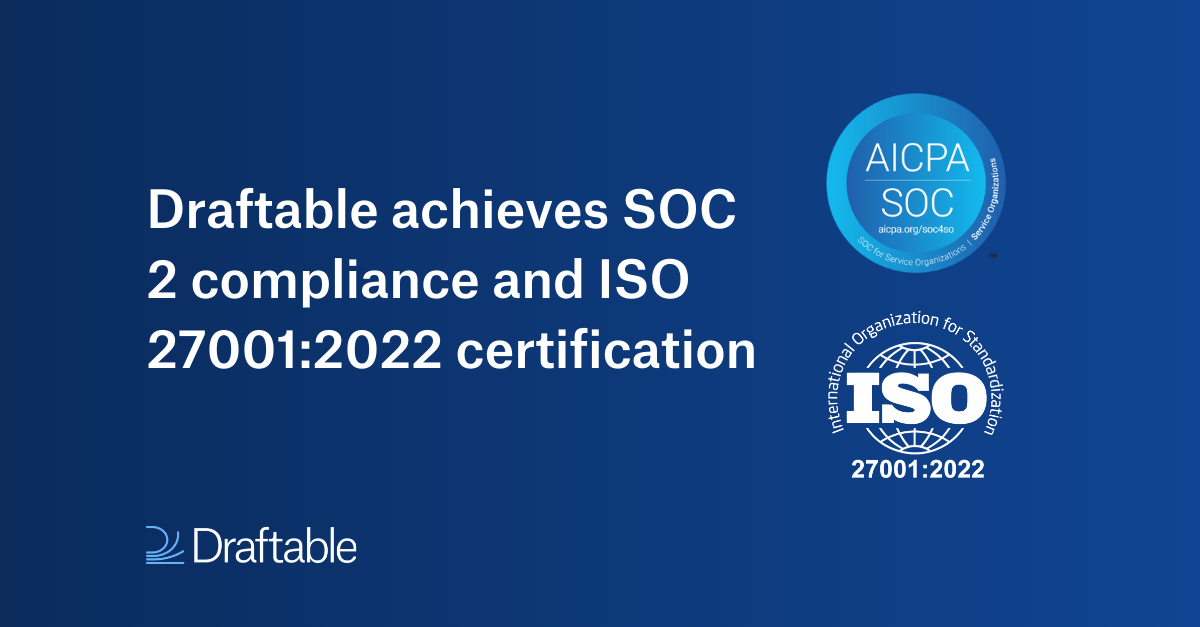
Draftable Product Lead, Dr Caspar Roxburgh, reflects on ILTACON 2024, sharing his key takeaways for law firms and legal teams.
As with every legal tech conference since the launch of ChatGPT in November 2022, generative AI was a hot topic at the International Legal Technology Association Conference (ILTACON) 2024, held in Nashville on August 11-15, 2024. Specific use cases for AI in law firms remain the primary discussion topic, however, more surprising was the conversation around cloud technologies and structuring of unstructured data as enablers of AI.
While law firms have historically stuck to on-premises tools and platforms, the evolution of generative AI and Large Language Models (LLMs) is now acting as a powerful catalyst, or “carrot”, driving firms to not only transition to the cloud but also get on top of their data, to effectively leverage new AI-powered tools.
How AI is reigniting the push to the cloud
There is a strong consensus among law firms that they must start learning how to use AI technology effectively. In the session, ‘AI Decision-Making: Identifying Use Cases Before Selecting a Solution, Reanna Martinez (Director of Innovation, Systems and Data at Munger, Tolles & Olson) recommended firms to start by deploying enterprise-grade general-purpose solutions like Microsoft Copilot to get AI in the hands of users, before exploring new AI features released in existing tools.
However, with most of these AI tools requiring cloud infrastructure to function optimally, the need to transition to the cloud has become a prerequisite for AI adoption. Firms wanting to utilise advanced AI capabilities must first ensure they are operating in an API-friendly environment (which may include on-premises API software).
Before the current hype around generative AI began, firms had already faced increasing pressure to adopt cloud technologies. Software providers like Microsoft have played a significant role in this, with moves such as warning of future deprecation of classic Outlook pushing firms to adopt Office 365. While there has been widespread reluctance to go ‘all in’ on cloud software, the promise of generative AI tools like Microsoft Copilot has added a compelling new incentive.
We’ve previously discussed how we’re moving towards a future where generative AI capabilities will be integrated into almost every software, starting with Copilot. We saw this in real-time at ILTACON 2024, with iManage revealing its roadmap with a major focus on its new cloud platform and Microsoft 365 integrations. Built entirely on Microsoft Azure, the iManage cloud platform will fully integrate with Office 365 including Copilot, allowing firms to use generative AI grounded in their iManage content from any endpoint on desktop, web or mobile.
This last point around device flexibility is another driving factor for moving to the cloud. We heard more firms saying they want to give their attorneys the option to work from anywhere, on any device, and you need a complete vendor and integration ecosystem built in the cloud to achieve this.
Read more: Why using ChatGPT helps law firms prepare for a generative AI future
AI integrations everywhere
iManage isn’t the only vendor hopping on the AI integration train. Other major players in the legal tech space, such as NetDocuments and LexisNexis, are also pushing new AI integrations. NetDocuments, which is already a cloud-first platform, has released ndMAX, a suite of AI-powered products embedded in the NetDocuments platform. LexisNexis has introduced Lexis+ AI, a legal generative AI solution that aims to transform legal research and workflows.
We also saw new vendors launching AI-powered products for the legal industry at ILTACON 2024. Australian startup Automatise developed Cicero, the first private AI for legal professionals, using open-sourced models operated on physical premises controlled by the company, providing enhanced security and data privacy. Competing with the well-funded but somewhat secretive Harvey, the emergence of more AI-first startups incorporating legal knowledge into LLMs is a welcome development.
Wrangle your data for greater security…
Moving to the cloud for greater flexibility, seamless integration ecosystems, and cloud-based AI tools is only the first part of the ILTACON 2024 story. To maximise the benefits of AI, firms must confront another significant challenge - understanding their data. One session we loved highlighted that most firms have a big data problem. Massive amounts of data (including highly confidential documents) remain stored on email exchanges and shared drives. There is widespread uncertainty around exactly what’s out there or how to find it. So how do you tackle this problem and get on top of structuring and securing your data?
Different strategies to approach this were shared in the session ‘Adding Structure to Your Unstructured Data – a Practical Approach’, presented by Terrence Coan from Harbor Global LLC, Madeleine La Cour from Baker Botts, Christopher Hockey from Alvarez & Marsal, and Shawn Knight from Vinson & Elkins.
Madeleine La Cour, Director of Business Intake and Records at Baker Botts, discussed implementing a three-year retention policy for emails. La Cour said it took two years just to prepare staff for the introduction of this policy, and they couldn’t have pulled it off without the support of the firm’s General Counsel.
To address the issue of data in shared drives, La Cour recommended locking people out of the data in shared drives. When staff want to access a document, they must first transfer it to the DMS with metadata.
While these approaches should be considered core practices for managing unstructured data security risks in law firms, it remains extremely challenging for firms to implement these practices, and it requires strong top-down support.
Read more: 10 security questions you should be asking your legal tech vendors
… And to train custom AI models for a competitive edge
While mitigating security risks is a top priority for firms, generative AI is again providing a fresh incentive to structure and secure data. After implementing AI tools via enterprise-grade solutions and AI features from existing vendors, the next step is to look for novel AI vendors and explore the option of training custom models. However, tailoring AI to a firm’s unique needs requires high-quality, structured data.
With well-organised data, firms have the option of training AI models to address specific use cases, such as improving legal research, automating document review, or even predicting case outcomes.
Law firms were also encouraged to collaborate with vendors to help shape the development of these tools. Firms can engage in pilot programs, provide feedback, and help tailor AI features to better meet their specific requirements. This collaborative approach ensures that the AI tools being developed are not only innovative but also practical and effective in real-world legal environments.
Read more: Balancing AI and human connection: Practical insights from the Australian legal industry
Key takeaways for Draftable
At Draftable, we are acutely aware of these industry trends and are actively responding to them with a new cloud offering for Draftable Legal.
We’re making it our strategic priority to build our cloud offering for Draftable Legal, expected to launch in early 2025.
While Draftable and the broader Affinda Group have always been a cloud-first operation, we designed Draftable Legal as a desktop solution to meet the specific needs of the legal industry for a traditional and secure document comparison solution. Off the back of ILTACON 2024 and wider conversations with our customers, we will expedite the development of new cloud-based versions of Draftable for the legal market.
Customers interested in learning more about this plan and shaping our cloud offering can register their interest in our early access waitlist by emailing product@draftable.com.
6 key takeaways from ILTACON 2024
- Start using AI technology: Law firms looking to explore AI tools should start by using enterprise-grade solutions like Microsoft CoPilot and new AI-powered integrations in their existing tech solutions.
- Transition to the cloud: Generative AI is providing law firms with both the incentive and tools to undertake significant technological transformations and access advanced AI platforms. The future of legal technology will be cloud-based with an ecosystem of software and integrations that all seamlessly interact with each other.
- Support device flexibility: Leveraging cloud platforms also provides flexibility for attorneys to securely work from anywhere, on any device.
- Improve data management: Law firms need to prioritise the identification and organisation of their unstructured data to mitigate unstructured data security risks. Implementing these policies is challenging, and teams will need to secure the support of partners and senior leadership to ensure the success of these initiatives.
- Leverage data for custom AI models: Structuring data has the added benefit of having a quality set of data to train custom AI models for a firm, tailored to their specific needs and use cases.
- Collaborate with tech vendors: Firms should also look to engage with legal tech vendors to shape the development of AI tools, participate in pilot programs, and provide feedback to ensure that AI solutions are practical and meet specific firm needs.




.png)
